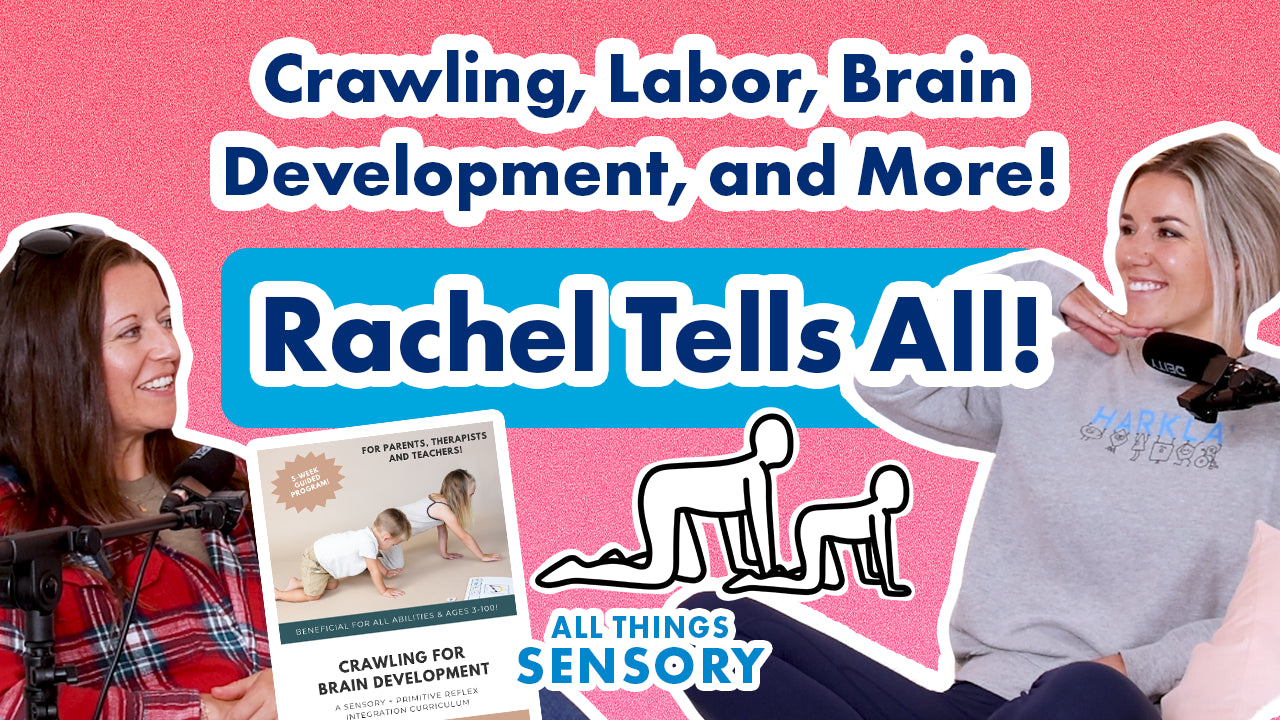Your Cart is Empty

Today we are chatting all about Rachel’s new curriculum: Crawling for Brain Development.
Get the inside scoop on how Rachel created this book, why she is so passionate about crawling, and how you can get your hands on this amazing curriculum!
Crawling for Brain Development© is a 5-week, guided program designed for children and adults ages 3-100+. It will benefit individuals of all abilities, whether they crawled in infancy or not. Parents can implement the program at home, teachers in their classrooms, and therapists in their treatment sessions and home exercise programs. In 150 pages, you will learn therapist-directed activities designed to move the brain out of fight-or-flight and into a higher level of functioning!
Check out all of the links below!
We’d love to answer your questions on the podcast! Fill out this form ->https://harkla.typeform.com/to/ItWxQNP3
All Things Sensory Podcast Instagram
Harkla Website - Shop Sensory Products!
Crawling for Brain Development Curriculum
When we think of crawling, we often picture babies scooting across the floor, but did you know that crawling is essential for brain development at any age? Whether you're a parent trying to support your child's growth or a therapist looking to improve client outcomes, incorporating crawling into daily routines could be the game-changer you're looking for.
Crawling is more than a physical milestone—it's a foundational skill that helps develop the brain. Studies show that when children skip crawling or don't engage in enough tummy time, they may miss out on crucial neurological development, leading to issues like dyslexia, dysgraphia, or retained primitive reflexes later in life.
Engaging in crawling activities on the floor can improve focus, enhance posture, and help regulate the sensory system. It's a simple yet powerful tool that benefits children, adults, and seniors alike.
Crawling provides deep pressure input to the joints, muscles, and tendons, calming and organizing the nervous system. This sensory input is constructive for children with ADHD or sensory processing challenges.
As you crawl, you work on disassociating the upper and lower body, which strengthens coordination between the left and right sides of the brain—crucial for higher-level skills like reading and writing.
Crawling requires your eyes to work together, which helps develop ocular motor skills. These skills are essential for tracking movement, reading smoothly, and even hand-eye coordination.
If you’re a parent trying to manage your child's sensory needs, introducing crawling into daily activities can be a simple yet effective strategy. You don't need special equipment—just a clear space and a few fun ideas.
If you're a pediatric occupational therapist, you know the importance of providing evidence-based interventions. Crawling is excellent for targeting sensory processing issues, primitive reflexes, and neuromotor immaturity.
Whether you're a parent seeking to support your child's development, a therapist looking for effective tools to use with clients, or simply someone who wants to improve focus, posture, and overall brain health, crawling is a simple yet powerful solution. Rachel Harrington’s book, Crawling for Brain Development, provides a clear, research-backed program that’s easy to follow and suitable for all ages.
By dedicating just a few minutes daily to crawling, you can unlock significant benefits for your body and mind. From improving coordination and strength to enhancing sensory regulation and cognitive function, this natural movement has the potential to make a noticeable difference.
BORING, BUT NECESSARY LEGAL DISCLAIMERS
While we make every effort to share correct information, we are still learning. We will double check all of our facts but realize that medicine is a constantly changing science and art. One doctor / therapist may have a different way of doing things from another. We are simply presenting our views and opinions on how to address common sensory challenges, health related difficulties and what we have found to be beneficial that will be as evidenced based as possible. By listening to this podcast, you agree not to use this podcast as medical advice to treat any medical condition in either yourself or your children. Consult your child’s pediatrician/ therapist for any medical issues that he or she may be having. This entire disclaimer also applies to any guests or contributors to the podcast. Under no circumstances shall Rachel Harrington, Harkla, Jessica Hill, or any guests or contributors to the podcast, as well as any employees, associates, or affiliates of Harkla, be responsible for damages arising from use of the podcast.
Keep in mind that we may receive commissions when you click our links and make purchases. However, this does not impact our reviews and comparisons. We try our best to keep things fair and balanced, in order to help you make the best choice for you.
This podcast should not be used in any legal capacity whatsoever, including but not limited to establishing “standard of care” in a legal sense or as a basis for expert witness testimony. No guarantee is given regarding the accuracy of any statements or opinions made on the podcast.
Comments will be approved before showing up.